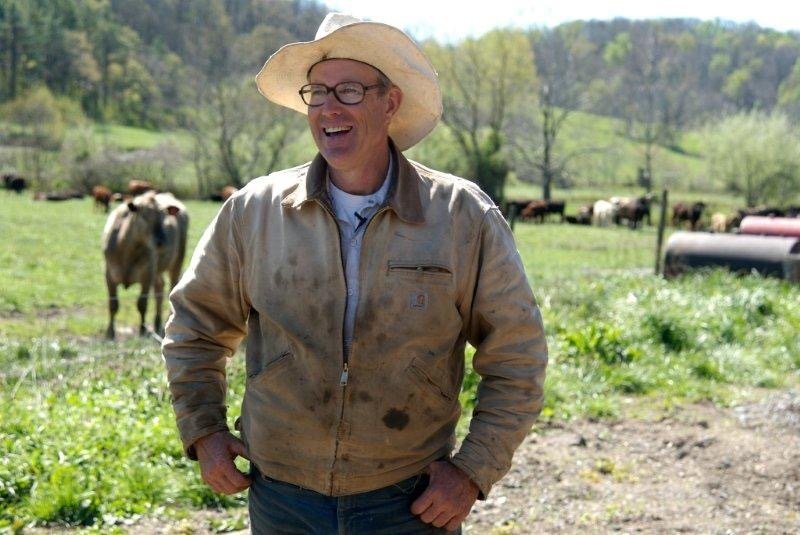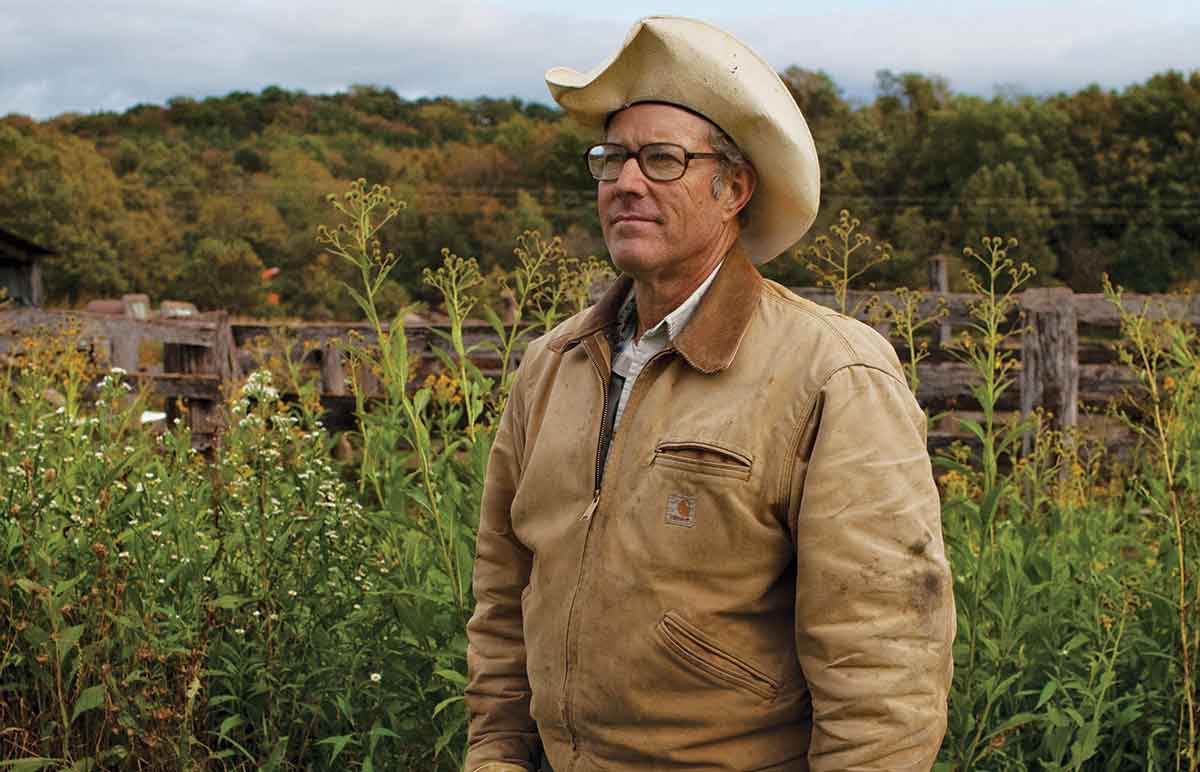Is there a future for small-scale farming in a world dominated by industrial agriculture? Joel Salatin, the self-proclaimed "Christian libertarian environmentalist capitalist lunatic farmer," believes there is, and hes betting his life on it. This man, who some call the most famous farmer in the world, isn't just tilling soil; he's cultivating a philosophy, a way of life that challenges the very foundations of our modern food system.
Salatin, operating from his Polyface Farm in Swoope, Virginia, in the heart of the Shenandoah Valley, has become a pilgrimage destination for organic farming enthusiasts. He champions regenerative agriculture, a holistic approach to animal husbandry that eschews harmful chemicals and embraces natural processes. He's not just raising livestock; he's building an ecosystem. For decades, Salatin has preached a gospel of responsibility, urging a declaration of independence from corporations and bureaucratic overreach. He wants both Food, Inc., and big government out of his fields, replaced by a system of localized, sustainable food production.
| Category | Information |
|---|---|
| Full Name | Joel F. Salatin |
| Date of Birth | February 24, 1957 |
| Age (as of 2024) | 66 years old |
| Birthplace | Venezuela |
| Height | 5 feet 9 inches (approximately 175 cm) |
| Weight | 75 kg (approximately 165 lbs) |
| Occupation | Farmer, Lecturer, Author |
| Farm | Polyface Farm |
| Location of Farm | Swoope, Virginia, Shenandoah Valley |
| Nationality | American |
| Political Views | Agrarian Libertarian |
| Religious Views | Christian |
| Known For | Regenerative Agriculture, Holistic Farming |
| Books | You Can Farm, Salad Bar Beef, The Marvelous Pigness of Pigs, Pastured Poultry Profits, and others. |
| Notable Appearances | The Joe Rogan Podcast |
| Philosophy | Promoting sustainable food production, independence from corporations and bureaucracy, and responsible land management. |
| Website | Polyface Farms Official Website |
Salatin's vision isn't just about better food; it's about a fundamental shift in how we relate to our environment and to each other. He embodies a regenerative organic farmer, deeply rooted in the land and committed to restoring its vitality. He calls for a return to responsibility, a rejection of the industrial model in favor of practices that nurture both the land and the community.
- Anthony Hamiltons Net Worth From Music To Millions 2024
- Dean Koontz News New Releases 2024 Updates You Need
But what exactly does this "lunatic farmer" do? Salatin's Polyface Farm is a living laboratory of innovative techniques. He practices rotational grazing, moving his cattle, pigs, and chickens strategically across the land to mimic natural patterns of animal movement. This not only improves the health of the soil but also reduces the need for artificial fertilizers and pesticides. He doesn't rely on harmful chemicals; instead, he uses the animals themselves to fertilize and cultivate the land. His methods are designed to create a symbiotic relationship between livestock, land, and consumer.
The old $2,000 bronco serves as a symbol of Salatins philosophy. It gets the job done, plain and simple. It embodies a practicality and resourcefulness that stands in stark contrast to the extravagance of modern industrial agriculture. It's a reminder that efficiency doesn't always require the latest technology; sometimes, it just requires a little ingenuity and a willingness to work with what you have.
Central to Salatin's approach is direct marketing. He sells his meat directly to consumers and restaurants, bypassing the complexities of the industrial food system. This allows him to maintain control over the quality of his product and build relationships with his customers. He sees the consumer as an active participant in the food system, not just a passive recipient. He wants people to understand where their food comes from and how it's produced.
- Explore Yul Brynners Iconic Films From Westworld To The King And I
- Steve Perrys Net Worth 2024 Journey Solo Career More
Salatins approach is not without its critics. Some argue that his methods are not scalable and that they cannot feed the world's growing population. Others question the economic viability of small-scale farming in a globalized market. Some even take issue with what they deem "Joel Salatins unsustainable myth," questioning the feasibility of his plans to raise bison and cultivate heirloom varieties of corn.
Despite these challenges, Salatin remains undeterred. He believes that the key to a sustainable future lies in empowering local communities and fostering a deeper connection between people and their food. He sees farming not just as a business but as a calling, a way to heal the land and build a more resilient society. He once mentioned planning to raise bison and grow "really old varieties of corn that a lot of the seed keepers in this area keep and need propagated." This speaks to his commitment to preserving agricultural heritage and promoting biodiversity.
Salatin's story began long before Polyface Farm became a renowned example of sustainable agriculture. He had his own laying hen flock at 10 years old, pedaling eggs on his bicycle to neighbors. This early experience instilled in him a deep appreciation for the land and a passion for producing food. It was the genesis of a lifelong journey dedicated to challenging conventional wisdom and forging a new path for agriculture.
His vision extends beyond the confines of his farm. He is a lecturer and author, sharing his knowledge and inspiring others to embrace regenerative agriculture. His books, including "You Can Farm" and "Salad Bar Beef," have become essential reading for aspiring farmers and anyone interested in learning more about sustainable food production. Through his writings and lectures, Salatin has become a leading voice in the movement for food sovereignty.
Salatin's journey is not just about farming; it's about faith. His work reflects a deep-seated belief in biblical principles of stewardship and dominion. He sees the land as a gift to be cherished and protected, not just a resource to be exploited. He embraces the idea that the glory of old men is their gray hair, viewing his experience as a valuable asset in guiding the next generation of farmers.
The essence of Salatin's philosophy revolves around building soil, nurturing the environment, and fostering local economies. He has experimented extensively to determine the best feed mixtures for his chickens, believing in keeping the mixture as simple as possible and using real ingredients. Here are the components of Salatins broiler mix (and why he includes each ingredient):
- Corn: Provides energy and carbohydrates.
- Soybeans: Offers protein and essential amino acids.
- Minerals: Ensures proper bone development and overall health.
- Probiotics: Supports gut health and digestion.
His meticulous attention to detail extends to every aspect of his farming operation, from the selection of his livestock to the design of his pastures. He believes that by creating a healthy and thriving ecosystem, he can produce food that is not only nutritious but also environmentally sound.
Jo Robinson once said of Salatin, "He's not going back to the old model." This statement encapsulates his unwavering commitment to innovation and his determination to create a new paradigm for agriculture. He is not simply trying to replicate the farming practices of the past; he is drawing upon them to create a system that is both sustainable and economically viable in the 21st century.
Born on February 24, 1957, Joel Salatin has dedicated his life to this vision. His age, 66 years old as of 2024, reflects a wealth of experience and a deep understanding of the land. He owns an expansive Polyface farmland in the Shenandoah Valley, Swoope, Virginia, where he raises cattle and other livestock. The meat produced from this farm is sold to a wide chain of restaurants and consumers through direct marketing, highlighting the success of his model.
At the Staunton Curb Market, Salatin has a family farm, further solidifying his commitment to local food systems. He stands 5 feet 9 inches tall and weighs 75 kg, dimensions that belie the towering impact he has had on the world of sustainable agriculture. In addition to his farming pursuits, he is a motivating speaker, inspiring audiences around the world with his message of hope and resilience.
Salatin has made many appearances on the Joe Rogan Podcast and written several books on his experience in regenerative agriculture, extending his influence to a wider audience. He shares his vision of the perfect chicken in articles for the McMurray Hatchery blog, contributing to the ongoing conversation about sustainable poultry farming. He advocates for breeding the old survivors back, emphasizing the importance of genetic diversity and resilience in livestock.
Joel Salatin, the "lunatic farmer," continues to preach the heresy of holistic farming, challenging the status quo and inspiring a new generation of farmers to embrace a more sustainable and responsible approach to agriculture. His work offers a vivid picture of biblical dominion, reminding us that we have a responsibility to care for the land and to use it wisely.
Joel Salatin, preaching the heresy of holistic farming, also emphasizes the importance of keeping the mixture as simple as possible and using real ingredients. This philosophy extends to all aspects of his farming operation, reflecting his commitment to transparency and authenticity.
In 2024, Joel Salatin continues to drive the roads of his property in his beloved old bronco, a symbol of his resourcefulness and commitment to practicality. He remains a powerful voice for change in the world of agriculture, challenging us to rethink our relationship with food and the land.
- Mikey Day From Orange County To Snl Star Bio Facts
- Daily Dose Of Internet Jason Gryniewiczs Viral Video Empire


